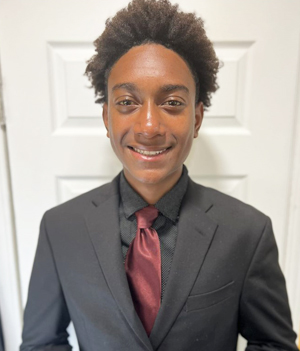Special to The Truth

The United States Department of Agriculture (USDA) Office of Partnerships and Engagement has chosen three Central State University students as part of its 2023 USDA/1890 National Scholars Program. Freshmen Shemaiah Butler, Michael Frazier, and Nasaan Jackson are among the 97 high school seniors and college freshmen and sophomores chosen from the countrywide pool of applicants to be so honored.
This specialized initiative partners the USDA with 1890 Land-Grant universities such as Central State to provide scholarship recipients with full tuition, fees, books, and room and board for up to four years of college enrollment. The program also provides professional and extracurricular training opportunities, including work experience at the USDA through summer internships.
Established in 1992, the highly competitive and prestigious scholarship program’s mission is to raise the number of students at 1890 Land-Grant universities studying agriculture, food sciences, natural resource sciences, and other related disciplines, with a focus on those who exhibit exemplary academic achievement, leadership traits, and provided community service.
The scholarship additionally provides scholars with a sponsoring agency coordinator who works closely with those selected. The agency coordinator grants ongoing support to scholars and ensures they stay on track with degree requirements.
The USDA/1890 National Scholars Program is implemented under the USDA Fellows Experience Program (FEP). Scholars accepted into the program will be appointed using the Schedule A(r) authority (5 CFR 213.3202) and are eligible for noncompetitive conversion to full-time employment upon graduation.
If selected, scholars may renew their grant each year, contingent upon satisfactory academic performance and adequate progress toward a bachelor’s degree. Upon graduation, they must commit to at least one year of service
to USDA for each year of financial assistance provided or they will be subject to reimbursing funds received.

“We’re proud to work with Central State University to support this important pathway for students pursuing careers in agriculture, nutrition, and food development,” said Melissa Blair, Public Affairs specialist at the USDA Office of Partnerships and Public Engagement.
“We’re really looking to give underserved communities an opportunity to get out of poverty, to get a meaningful career, and to get into a cutting-edge career,” Isabel Brumley, USDA liaison for the state of Ohio, said. “The goal is to ensure that by the time our scholars graduate, they can automatically qualify for a good-paying job on an excellent career path.”
Brumley, who has a social work educational background and has been with the USDA for the past 15 years, added through the program, students are exposed to leadership and engagement opportunities that will help them to one day “make their mark in the [agriculture] industry.”
It is Brumley’s determination that, since many members of underserved communities are victims of discrimination, “correcting of wrongs,” as she put it, is greatly needed throughout the agriculture field. Equal opportunity to engage in the field is the overall goal of the USDA’s implementation of the scholarship.
To qualify for the program, students must: Be a U.S. citizen; have a cumulative GPA of 3.0 or better (on a 4.0 scale); have been accepted for admission or currently attending one of the 19 1890 Historically Black Land-Grant Universities; study agriculture, food, natural resource sciences, or other related academic disciplines; demonstrate leadership and community service; submit an official transcript with the school seal and an authorized official’s signature; submit a signed application (original signature only); and, achieve 21 ACT, 1080 SAT scores.
“I’ve always been told that when you have a vision you can turn it into reality,” Westerville, Ohio-born Frazier said. “I began to really try to see myself and what I would be doing in order to be successful in the future.”
“I feel that this is where the USDA and the scholarship could help me,” Frazier continued. “With the contribution of this scholarship, I could be one great step closer to achieving my goals and working to make a better community.”

As a high school senior, Butler discovered an interest in rural business and cooperative service after reading materials he received through USDA’s outreach push.
“Having the ability to assist and create wealth and support rural America is huge,” Butler said.
“I want to help focus on a future where the lives, leadership, dreams, and brilliance of Black, Indigenous, and all people of color (BIPOC) are supported and enhanced by an economic system that is democratic, just, and adaptive. Working for the USDA would be an opportunity that would help me to become a better version of myself and help others like me.”
Over the span of his youth, Jackson learned, “Food is an important part of our daily life. I grew interested in understanding how food gives us nutrition and health.”
After researching the USDA, he found that it conducts critical analysis of not only food and nutrition but also health and safety, urban agriculture, conservation, farming, and much more.
“I know the USDA staff take their job seriously and I would love to be a part of their team,” Jackson said.
“With the scholarship, I am able to dedicate most of my time to my schoolwork instead of worrying about financial problems that I would have had to handle without the scholarship. Also, receiving the scholarship helped me make my decision on doing agricultural business in the future.”
